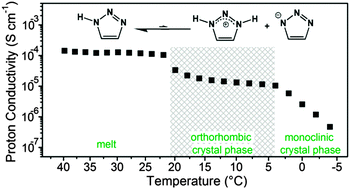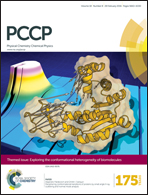Proton conductivity and phase transitions in 1,2,3-triazole†
Abstract
1,2,3-Triazole (TR) is a good proton conductor which is tidely related to formation of a hydrogen bond network along the N–H⋯N trajectory and its self-dissociation into diH-1,2,3-triazolium and 1,2,3-triazolate. To gain a deeper understanding, the proton conductivity of TR is measured by impedance spectroscopy (IS) across its melting temperature and an additionally discovered solid–solid phase transition. The orthorhombic high temperature phase and the monoclinic low temperature modification are investigated by polarized optical microscopy, DSC- and WAXS measurements. Furthermore, the diffusion coefficients of TR are determined from IS data and measured by 1H PFG NMR spectroscopy in the melt which allows for separate evaluation of contributions of proton hopping across the hydrogen bond network and the vehicle mechanism to the proton conductivity where the vehicles are defined as charged species generated by TR self-dissociation. Finally, the degree of dissociation of TR is calculated and the influence of the self-dissociation of TR on the proton conductivity is discussed in the context of the dielectric constant.


 Please wait while we load your content...
Please wait while we load your content...